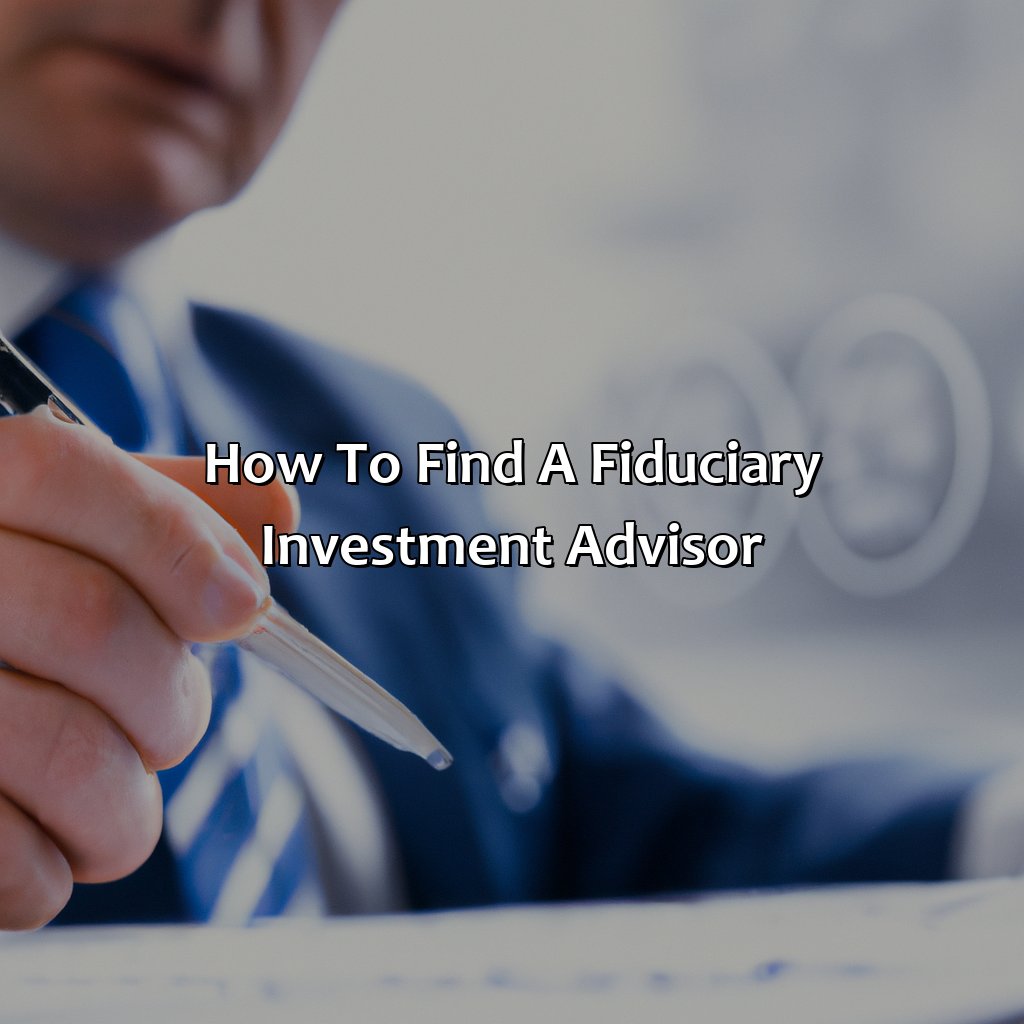How To Find A Fiduciary Investment Advisor?
Key Takeaway:
- Understanding fiduciary investment advisors is important: Fiduciary investment advisors are legally bound to act in their clients’ best interests and provide unbiased advice. This type of advisor can help clients reach their financial goals while avoiding any conflicts of interest.
- Steps to find a fiduciary investment advisor include identifying your financial goals, researching potential advisors, verifying their credentials and experience, evaluating fee structures, and scheduling an initial consultation. Each step is crucial to ensure that you find an advisor that is the right fit for you and your financial needs.
- When evaluating a potential fiduciary investment advisor, it is important to ask questions about their investment approach, experience, and fees. Additionally, making a final decision on an advisor should be based on a combination of their qualifications, experience, and personal compatibility.
Do you need help managing your investments but don’t know where to start? A fiduciary investment advisor can be the answer. Learn how to find a trustworthy advisor and secure your financial future.
Understanding Fiduciary investment advisor
Investment advisors who are fiduciaries are legally bound to act in the best interests of their clients. They are required to disclose all fees and conflicts of interest, which enables clients to make informed decisions. When searching for a fiduciary investment advisor, look for credentials such as the CFP or CFA. Additionally, consider the advisor’s experience, their investment philosophy, and how they communicate with clients. Finding a fiduciary investment advisor who aligns with your financial goals and values is crucial for a successful, long-term relationship.
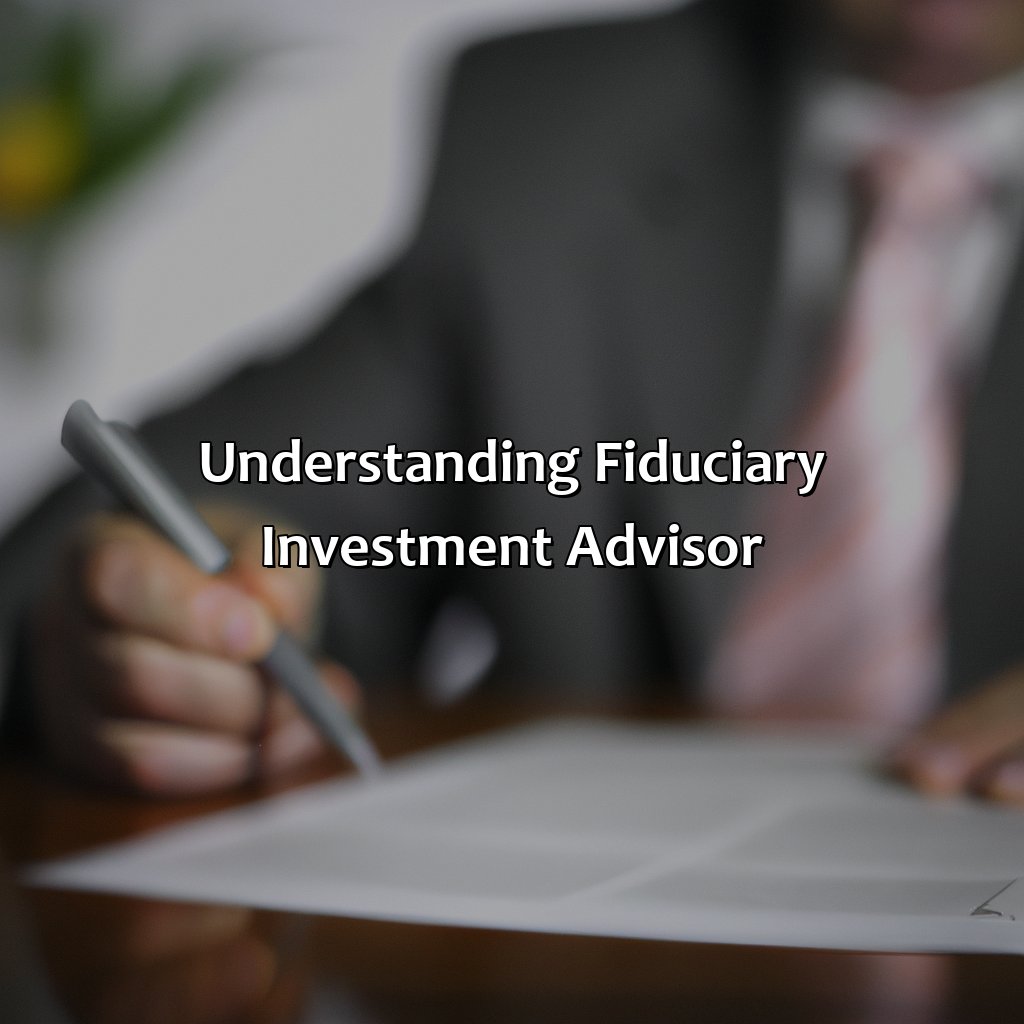
Image credits: retiregenz.com by David Woodhock
Importance of finding a fiduciary investment advisor
Finding a trustworthy investment advisor is significant for securing your financial future. A fiduciary investment advisor is a person or a firm who is legally obligated to act in your best interest, unlike non-fiduciaries who may sell financial products based on commissions. Hiring a fiduciary investment advisor ensures transparency and accountability in your investments, along with objective advice that is not driven by personal gain.
When it comes to finding a fiduciary investment advisor, you must do your research. Look for an advisor who holds a fiduciary duty to clients, check their credentials, experience, and reputation in the industry. You can ask for referrals from friends, family, or colleagues who have worked with an investment advisor before. It is also essential to understand the fee structure and compensation of the advisor to avoid any conflicts of interest.
A key factor that sets fiduciary investment advisors apart from non-fiduciaries is their legal obligation to disclose conflicts of interest. Fiduciaries must put clients’ interests ahead of their own, thereby reducing the risk of any bias or unethical practices. Additionally, fiduciary advisors are required to provide regular status reports on your investments and make recommendations based on your financial goals.
Pro Tip: Before hiring a fiduciary investment advisor, make sure you understand their investment strategy and how it aligns with your financial goals. It is also crucial to have open communication with your advisor and regularly review your portfolio to ensure it is meeting your objectives.
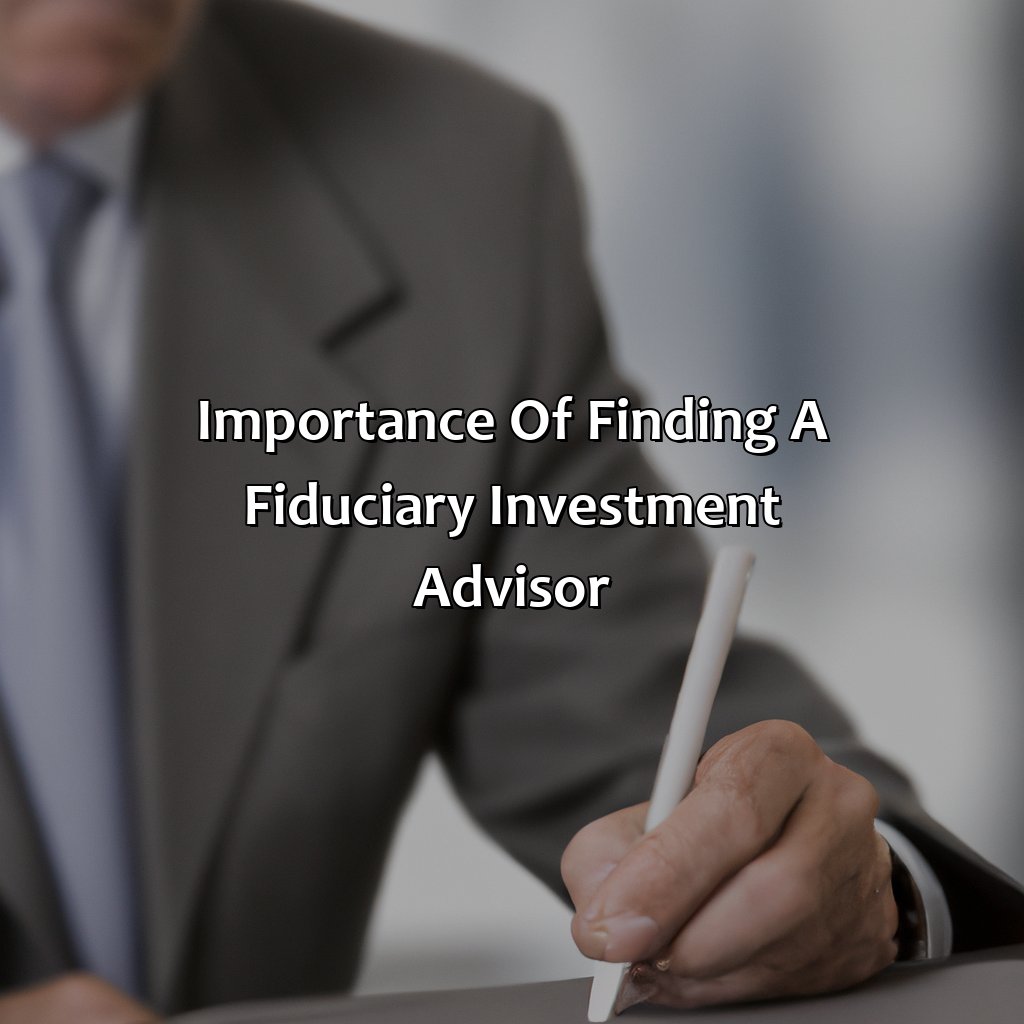
Image credits: retiregenz.com by David Arnold
Steps to find a fiduciary investment advisor
Discover a fiduciary investment advisor to match your financial objectives. Take the following steps:
- Figure out your financial goals.
- Do research on potential advisors. Find out their credentials and experience.
- Look into fee structures to guarantee transparency and ethics.
- Set up an initial consultation. Ask questions and review details.
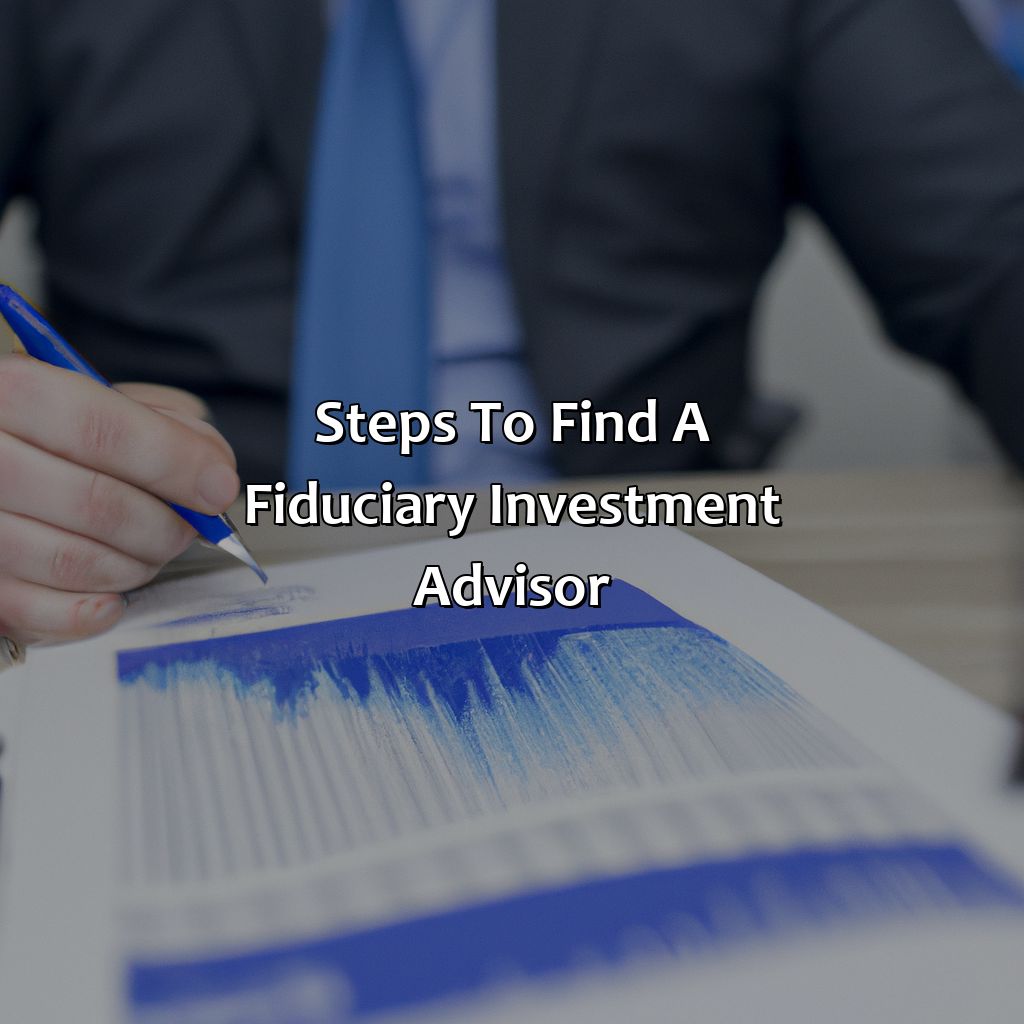
Image credits: retiregenz.com by David Duncun
Identify your financial goals
Once you conceptualize your personal objectives, it’s time to identify your fiscal goals. Pinpoint specific short and long-term financial aspirations to help you prioritize investment strategies. This enables you to pick the right fiduciary investment advisor who can guide you towards achieving these financial goals.
A skilled fiduciary financial advisor can help investors navigate the multi-layered and complex nature of financial transactions, provide guidance customized to meet a client’s unique requirements. Typically, identifying your fiscal objectives involves evaluating risk appetite, defining an appropriate time horizon, assessing liquidity needs, understanding tax implications and considering possible inflationary pressures.
It is also crucial to bear in mind that the component of short-term spending should not be overlooked while planning for long-term investment goals. Planning how much you need at present or in the near future makes sure your overall strategy remains focused even if there are unexpected events that occur later on.
Case in point: A young couple with significant student debt and managing their expenses was looking for a fiduciary adviser who could set retirement savings goals while accounting for their current budget constraints- this required them to choose an experienced advisor with empathy who could craft a tailor-made strategy prioritizing near-term concerns without impeding progress on longer-term objectives.
Finding a fiduciary investment advisor is like finding a needle in a haystack, but don’t worry, we’ve got a magnet.
Research potential advisors
When seeking a fiduciary investment advisor, it is crucial to conduct a thorough search. Utilize financial industry directories and websites that list advisors to find potential candidates. Additionally, reach out to professional associations and ask for referrals from trusted individuals in your network.
Perform due diligence on each potential advisor by reviewing their educational background, credentials, and experience. Check for any disciplinary actions or legal issues on their record. Request references from current clients and speak with them about the advisor’s performance.
Furthermore, consider meeting with prospective advisors in person to assess their communication style and personality fit. This will ensure that they understand your needs, goals, and preferences thoroughly.
Finally, when choosing an advisor, prioritize trustworthiness and transparency over low fees or promises of high returns. Remember to review all contracts carefully before signing and request that all terms be clearly explained in plain language.
In summary, research several potential fiduciary investment advisors through various channels such as associations and referrals; perform due diligence by reviewing credentials and speaking with clients; meet in person to evaluate communication skills and compatibility; prioritize trustworthiness above low fees; review all contracts thoroughly prior to signing.
Finding a fiduciary investment advisor with no credentials and experience is like trusting a toothless dentist with your smile.
Verify credentials and experience
To ensure the reliability of a financial advisor, it is crucial to evaluate their qualifications and experience. Scan for their registration with regulatory authorities ensuring competence standards. Moreover, seek information about their skillset strategies and overall track record to evaluate their trustworthiness.
Consult ratings and comparisons published periodically by accredited institutions. Their reports can help you choose investments that are tailored to your objectives.
It’s not enough to rely solely on an advisor’s credentials; they must have sufficient experience in their field of expertise. Choose advisors who have been actively practising for at least five years or more.
According to Investopedia, only 20% of financial advisors in the US are registered as fiduciaries – legally obligated to prioritize client interests before their own profits. Therefore choosing advisers licensed as fiduciary investment managers is wise for greater accountability and transparency.
Finding a fiduciary investment advisor with a fee structure that doesn’t make your eyes water is like finding a unicorn in a haystack.
Evaluate fee structures
To assess payment methods for financial advisors, follow these steps.
- Review the following fee structure types:
- Consider other factors like experience and credentials in addition to fees when seeking a financial advisor.
| Fee structure type | Description |
|---|---|
| AUM (Assets Under Management) | An annual charge based on the total amount of money invested. |
| Flat fee | A lump-sum amount that is charged each year or quarter. |
| Hourly rate | The advisor charges by the hour for their services rendered. |
| Performance-based fee | Funds are paid according to investment returns, not just based on assets under management. |
Fear of selecting an untrustworthy advisor results in hindering your financial outcomes and potentially significant losses. Get ready to spill your financial tea and have a stranger judge your life choices.
Schedule an initial consultation
To initiate the process of finding a fiduciary investment advisor, it is essential to secure an introductory meeting. A primary consultation can answer many questions undiluted and be a key factor in making an informed decision.
During the initial consultation, the potential advisor must introduce themselves while discussing their services and fees in detail. Additionally, they will ask for understanding of your current financial situation to know how best they can assist you. More so, you could request evidence of any licenses or credentials as proof of professional and ethical standards.
Lastly, consider proposing some questions during the preliminary meeting to aid in clarifying any doubts whatsoever. It’s also advisable to remove ambiguities regarding fee arrangements or investments strategies proposed by them.
By scheduling an initial consultation with a fiduciary investment advisor, clients can make an informed decision about whether or not the advisor is suitable for them without further commitments or financial obligations.
Before you trust someone with your money, make sure you ask the tough questions – like, “How many times have you seen Wolf of Wall Street?“
Questions to ask a potential fiduciary investment advisor
When searching for a fiduciary investment advisor, it is crucial to ask the right questions to ensure that your interests are protected and that you make informed decisions. Here are several key questions to ask a potential advisor:
- What is your fiduciary duty, and how do you ensure that you meet it?
- How do you get compensated, and is it in my best interest?
- What is your investment philosophy, and how do you tailor your strategies to my needs?
- Do you have any potential conflicts of interest, and how do you mitigate them?
It is essential to consider these questions carefully and evaluate the answers to ensure that the advisor can provide the level of service you require. Keep in mind that the selection of a financial advisor is a crucial decision that could significantly impact your financial future.
When selecting an advisor, it is also important to check their credentials, experience, and reputation . You can ask for their certifications, such as the Certified Financial Planner (CFP) designation and their professional experience, to evaluate their expertise and professionalism.
In a particular instance, a friend hired an advisor who promised high returns and convinced them to invest in a risky scheme. Unfortunately, the scheme resulted in significant losses, and the advisor never owned up to the mistake or took responsibility for the loss. Hence, it is essential to ask the right questions and carefully evaluate the advisor’s answers before entrusting them with your financial planning.
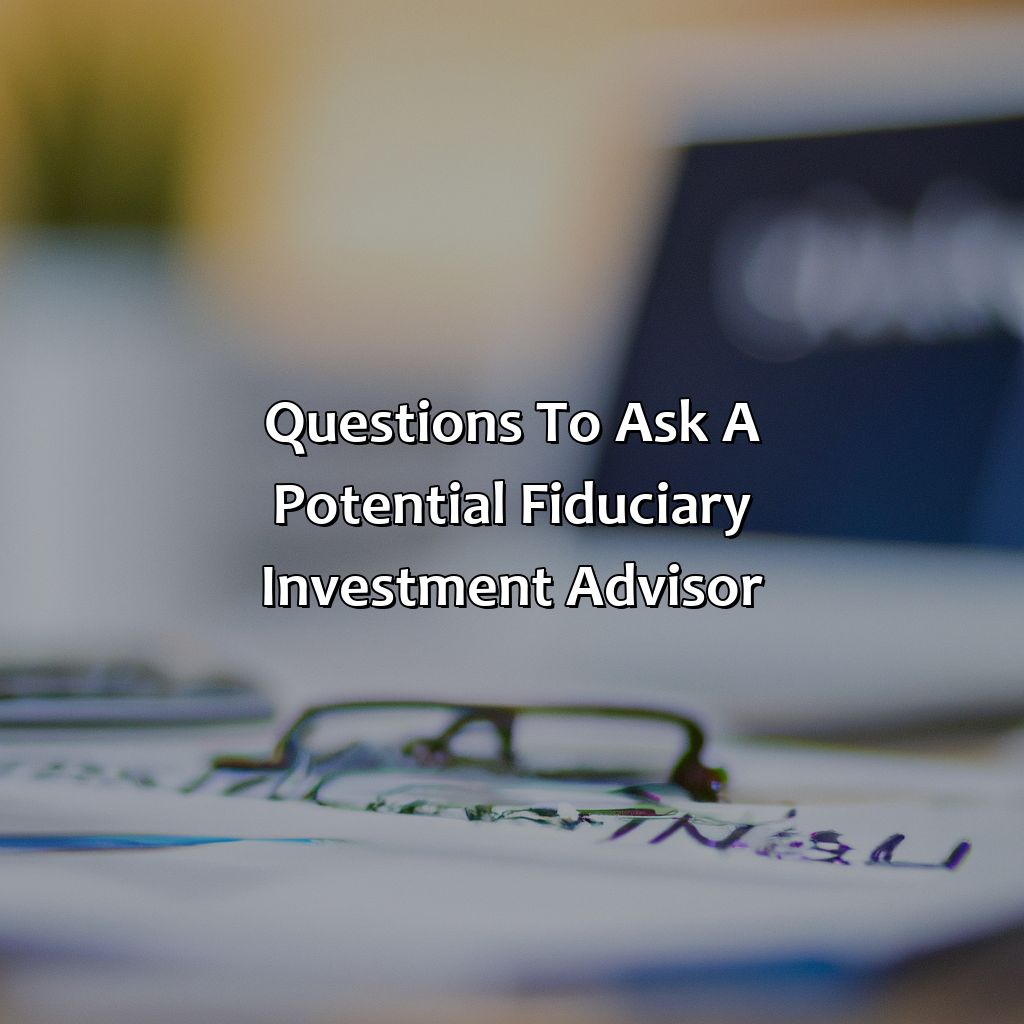
Image credits: retiregenz.com by Adam Arnold
Making a final decision on a fiduciary investment advisor
When choosing a fiduciary investment advisor, it is critical to consider various factors such as their experience and qualifications, investment strategy, fees, and level of communication. Thoroughly research potential advisors and ask for referrals from trusted sources. Review the advisor’s fiduciary oath to ensure they prioritize the client’s best interests. Evaluate their track record and investment approach to determine if it aligns with your financial goals. Before making a final decision, make sure that the advisor clearly communicates their strategy and fees and ensures transparency throughout the investment process. Don’t risk missing out on a potential match by rushing the decision-making process or failing to prioritize your financial future.
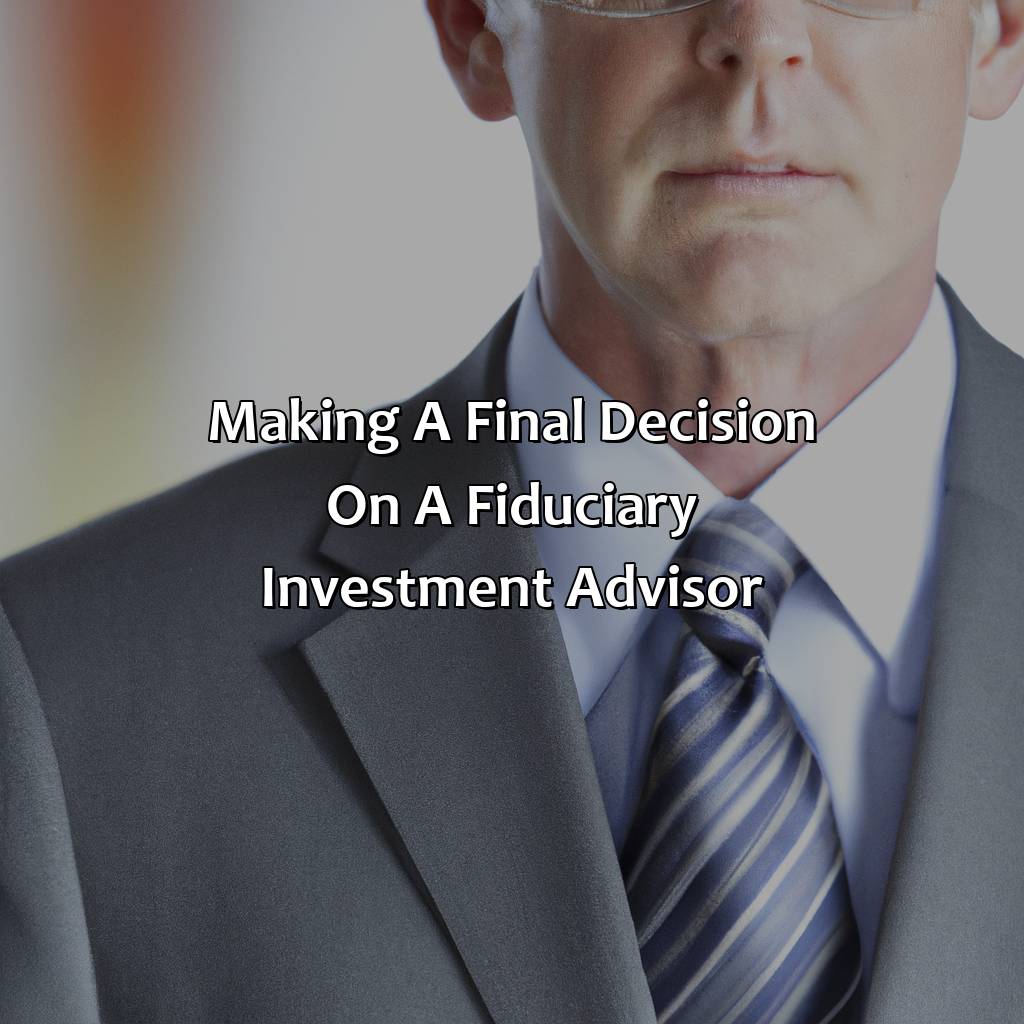
Image credits: retiregenz.com by James Duncun
Five Facts About How To Find A Fiduciary Investment Advisor:
A fiduciary investment advisor is legally required to act in the best interests of their clients. (Source: Investopedia)
Look for an advisor who is registered with the Securities and Exchange Commission or your state’s securities regulator. (Source: AARP)
Fiduciary advisors should be transparent about their fees, conflicts of interest, and investment strategy. (Source: Forbes)
Consider asking for referrals from trusted sources, such as family, friends, or other professionals. (Source: NerdWallet)
Check an advisor’s professional background and disciplinary history on websites like FINRA’s BrokerCheck or the SEC’s Investment Adviser Public Disclosure database. (Source: The Balance)
FAQs about How To Find A Fiduciary Investment Advisor?
How can I find a fiduciary investment advisor?
To find a fiduciary investment advisor, you can start by searching online directories like the National Association of Personal Financial Advisors (NAPFA) or the Financial Planning Association (FPA). You can also ask for referrals from friends or family members who have worked with a fiduciary investment advisor in the past.
What is a fiduciary investment advisor?
A fiduciary investment advisor is a professional who is legally obligated to act in the best interests of their clients. They must avoid any conflicts of interest and always put their clients’ needs ahead of their own.
What should I look for when choosing a fiduciary investment advisor?
When choosing a fiduciary investment advisor, make sure they have the necessary credentials, such as a Certified Financial Planner (CFP) designation. You should also ask about their investment philosophy, their fees, and their approach to risk management and asset allocation.
What are the advantages of working with a fiduciary investment advisor?
The main advantage of working with a fiduciary investment advisor is that they have a legal and ethical obligation to act in your best interests. They can provide unbiased advice and recommendations, which can help you achieve your financial goals more effectively.
How much does it cost to work with a fiduciary investment advisor?
The cost of working with a fiduciary investment advisor can vary depending on the advisor’s experience and the services they provide. Some advisors charge a flat fee, while others charge a percentage of the assets they manage. You should ask for a detailed breakdown of fees before choosing an advisor.
Can I trust that a fiduciary investment advisor will always act in my best interests?
While fiduciary investment advisors are legally obligated to act in your best interests, it is still important to do your due diligence and choose an advisor who has a strong reputation and track record of putting their clients first. Always ask for references and check online reviews before making a decision.
 Checkout this IRS Loophole
Checkout this IRS Loophole 
